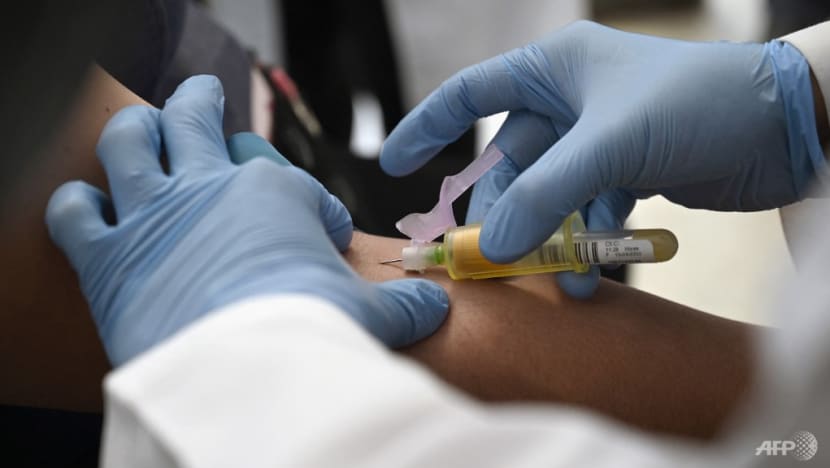Fewer Singapore residents diagnosed with HIV, with 198 new cases from January to October

A technician extracts blood from a patient for an HIV test. (Photo: AFP/Alfredo Estrella)
SINGAPORE: A total of 198 new HIV cases were reported among Singapore citizens and permanent residents between January and October, said the Ministry of Health (MOH) on Wednesday (Dec 1).
The figure is 10 per cent less than in the same period last year, and it could be due to the impact of the COVID-19 pandemic, said the ministry.
For the whole of last year, 261 HIV cases were reported, down from 323 the year before.
Most of the new cases involved men.
Of the 119 cases reported in the first half of the year, 93 per cent were men, said MOH in a media release.
The majority were below 60 years old, with 48 per cent aged between 20 and 39, and 33 per cent in the 40 to 59 age group.
Sixty per cent had late-stage HIV when they were diagnosed, a 6 per cent increase from the same period last year.
"Sexual intercourse remains the main mode of HIV transmission, accounting for 94 per cent of the 119 cases," said MOH.
"Homosexual transmission was the mode of transmission for 55 per cent of all cases, while 35 per cent were from heterosexual transmission and 4 per cent from bisexual transmission."
MAJORITY OF CASES DETECTED DURING MEDICAL CARE
The Health Ministry said that the majority of all new cases - 57 per cent - were detected through HIV tests done during medical care, typically at a late stage of infection.
Another 15 per cent were detected during routine programmatic HIV screening, while 21 per cent were detected through self-initiated HIV screening.
The rest were detected through other forms of screening.
"A higher proportion of homosexuals/bisexuals (30 per cent) had their HIV infection detected via self-initiated HIV screening compared to heterosexuals (10 per cent)," the ministry said.
The most effective way to prevent HIV infection was to avoid casual sex, said MOH.
It added that those who engage in high-risk sexual behaviour, such as having multiple sexual partners or engaging in casual or commercial sex, are strongly advised to use condoms to reduce their risk of HIV infection and other sexually transmitted infections.
Those at risk of HIV infection are urged to go for regular testing.
"Regular HIV testing and early diagnosis can facilitate early treatment and care," said MOH.
"This would also provide an opportunity for infected persons to protect their partners from infection, as HIV-positive individuals who are on treatment and have an undetectable viral load have practically no risk of transmitting the virus to their sexual partners."
The ministry added that with early and effective treatment, people living with HIV can continue to lead active and productive lives.















